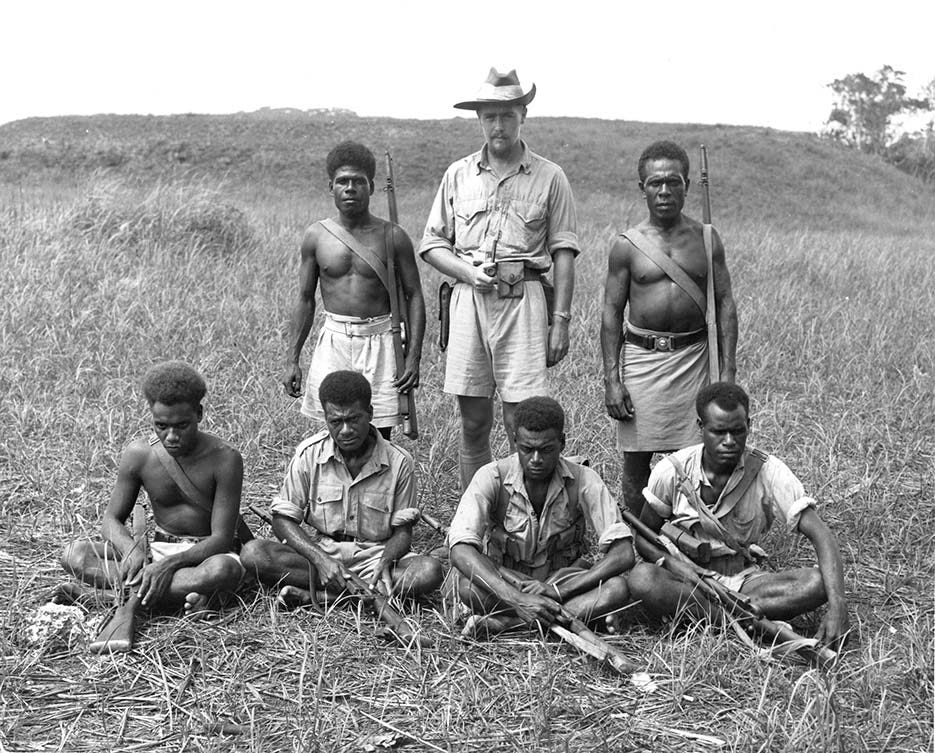The ordeal of Jacob Vouza
20th August 1942: A scout for the US Marine Corps on Guadalcanal refuses to give up their positions under torture by the Japanese
The British Protectorate of the Solomon Islands represented the farthest reaches of the Japanese landings of early 1942. The sparsely populated tropical islands had been administered before the war by British ‘District Officer’s assisted by native islanders in the role of police.
When the Japanese invaded the District Officers and the native police became the British Solomon Islands Protectorate Defence Force. They took to the hills and, living in hiding, became ‘coast watchers’ reporting by radio on Japanese activities.
Then on the 7th August the United States began their first land based operations against the Japanese in the Pacific. The US Marines landed on Guadalcanal unopposed, capturing the airfield that the Japanese were building on the island when the engineers fled.
The Guadalcanal District Officer, Martin Clemens, became attached to the Marine Corps encampment as an intelligence officer and the police became reconnaissance scouts for the Marines - who only possessed very rudimentary maps of the islands at this time.
On the 20th August the Marines learnt of Japanese landings in strength some distance away - and Sergeant Jacob Vouza went off to investigate.
Early on the 21st the perimeter of the Marine positions along the Tenaru river came under attack. At the same time Martin Clemens1 was called to a command post just a 100 yards behind the front line, where ‘a mortally wounded native’ had just staggered in:
It was Vouza. He was an awful mess, and unable to sit up. I could hardly bear to look at him. We dragged him behind the jeep, and there, in spite of a gaping wound in his throat, he told me his story as best he could.
On his patrol Vouza had taken a miniature American flag given him as a souvenir. He tried to hide it at Volonavua, but the area was thick with enemy troops and he barely got away. Near Makile, Vouza approached what he thought was Captain Brush’s patrol, only to find that it was the Japanese patrol later ambushed by Brush’s Marines.
‘The soldiers smashed his face with rifle butts, slashed him with a sword, and made him lie on a nest of red ants; still he did not answer.’
Caught red-handed, he was hauled before the regimental commanding officer, Colonel Ichiki; Ishimoto, who interpreted, recognized him. He was brought to Gaimale and left in the sun, tied by straw ropes to a tree; but he would not divulge our dispositions.
The soldiers smashed his face with rifle butts, slashed him with a sword, and made him lie on a nest of red ants; still he did not answer. They then hung him in a tree until he passed out from wounds and exposure. At dusk they took him down, tied his wrists, and moved into position for the attack, taking him with them.
When the assault began, Vouza’s guards were ordered to dispatch him. • Since shooting would give away their position, they bayoneted him repeat edly and left him for dead.
Vouza received seven wounds in his chest and another, the biggest of all, in his throat. As the battle unfolded, he staggered away and managed to bite through the cords that bound him.’
‘Vouza received seven wounds in his chest and another, the biggest of all, in his throat. As the battle unfolded, he staggered away and managed to bite through the cords that bound him.
He must have walked or crawled nearly three miles, right through the battle field. At the Marine outpost, Pvt.Wilbur F.Bewley, of Company G, 2d Battalion, 1st Marines, saw that he was not a Jap, but on our side.
As if that weren’t enough, Vouza insisted on spluttering out to me a very valuable description of the Japanese force, its numbers and weapons. This was passed on immediately; a bullet hit the jeep as I lay behind a tree telephoning it in.
Vouza, who had lost pints of blood, was in terrible shape. He fully expected to die, and before he passed out again he gave me a long last message for his wife and children. I wrote with one hand and held his hand with the other. Once he had done his duty, the terrific strain told, and he collapsed.
We carried him back and got the doctors operating on him. They pumped Vouza full of new blood, and amazingly it was expected that he would live - if, that was, the hospital was not disturbed by air raids.
What loyalty the man had! I felt immensely proud.

Vouza made such a recovery that he subsequently became Chief Scout for the 2nd Raider Battalion - 'Carlson's Raiders'.




